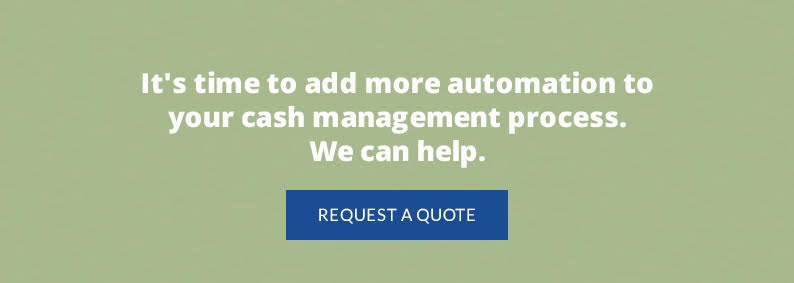Cash is still one of shoppers' preferred payment methods. Although debit and credit cards have been growing in popularity, many North Americans still use cash for smaller purchases.
As a result, most business owners can expect that they’ll need to handle a large volume of cash transactions well into the future. Although the idea of a cashless society intrigues some experts, chances are cash is going to stick around a lot longer than they think.
Since you’re going to continue handling cash, you should be paying attention to the costs associated with it. Many people talk about the cost of cash itself, but fewer notice the cost of ignoring cash automation. You may not think you need to invest in new technology, but this decision could end up costing your business more.
What Is Cash Automation?
The idea behind any automation effort is to make time-intensive manual processes more efficient. Why should your employees handle a task when a machine can do it with greater speed and accuracy?
Until recently, cash handling was largely manual. Machines were employed, but they were of relatively limited use. With improvements in technology, today’s cash handling devices are smarter and more versatile than ever.
As a result, they can take over tasks like counting and sorting cash. Some solutions can even streamline your pick-ups and deposits.
Time Is Money
Up front, cash management technology may seem like it has a high cost.
In most cases, manually handling your cash is costing more. The cost of cash in a business can be quite high thanks to a few factors.
The first factor is time. Every second an employee spends sorting and counting cash costs your business. If a machine can do it faster, you can lower the costs of cash by reducing the amount of time your team spends on it.
The Penalties of Inaccuracy
Another way your manual cash handling costs you is through inaccuracy. Whenever someone makes a mistake, your team must locate the error and correct it.
That takes time, which increases the labour costs associated with cash management. It also eats up time your team could spend on other, value-adding jobs.
Diminished Productivity
Cash automation can help your bottom line in another way. The more time your employees spend handling cash, the less time they have for other tasks. What if they could be taking care of value-adding jobs, such as helping customers?
Cash automation frees up their time, which allows them to undertake these jobs. As your team becomes more productive, your bottom line will also rise.
Inefficiencies Are Costly
Inefficiency can also be the root cause of higher bank and CIT fees. Your team may end up making multiple deposits or requesting more frequent pick-ups due to an inefficient process.
With cash automation, you can streamline your banking operations. This could help you control costs.
As you can see, not adopting cash automation may cost you much more than you realize. Look for high-quality solutions and services and do away with manual processes for good.



